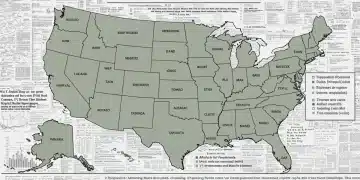Monthly U.S. budget deficit analysis: what it means

The monthly U.S. budget deficit occurs when government spending exceeds revenues, impacting the economy by increasing borrowing costs, inflation, and potentially reducing public services.
Monthly U.S. budget deficit analysis gives us a glimpse into how the nation manages its finances. Have you ever wondered what these numbers mean for you and the economy? Let’s dive in!
Understanding the monthly budget deficit
Understanding the monthly budget deficit is crucial for grasping how the U.S. manages its finances. Every month, the government compares its revenues to its expenditures. When expenses exceed income, a deficit occurs. This simple concept has a big impact on the economy.
How the Budget Deficit Works
A budget deficit happens when the government spends more than it earns. This situation is often addressed by borrowing money. Over time, this borrowed money can add up, leading to a larger national debt.
Factors Influencing the Monthly Deficit
Several key factors can affect the size of the monthly budget deficit:
- Economic conditions, such as recessions or booms
- Changes in tax policies that affect government revenue
- Unexpected expenses, such as natural disasters or pandemics
Each of these elements plays a role in shaping the overall financial picture. For instance, during a recession, tax revenue typically drops while government spending for aid may increase.
Another important aspect to consider is the national debt. Continuous borrowing to cover deficits can lead to a situation where the government has to pay interest on its debt. This can limit future spending and investment possibilities.
Implications of a High Budget Deficit
A high monthly budget deficit can have several consequences:
- Increased interest rates as the government competes for loans
- Potential inflation due to higher spending without corresponding revenue
- Reduced capacity to fund public services in the long term
Staying informed about the monthly budget deficit helps citizens understand its implications on economic policies and personal finances. The pattern of deficits can influence government decisions, affecting everything from taxes to social services.
Overall, analyzing the causes and effects of the monthly budget deficit reveals insights into government financial management. By keeping track of how these dynamics work, individuals can become more informed voters and citizens.
Key factors influencing the budget deficit

Several key factors significantly influence the budget deficit. Understanding these elements helps to grasp the complexities of government finances and economic health. Each factor intertwines with the larger economic environment, creating a dynamic and often unpredictable financial landscape.
Economic Conditions
The state of the economy plays a crucial role in shaping the budget deficit. During economic downturns, such as recessions, tax revenues often decrease. This drop occurs because individuals and businesses earn less, leading to lower tax collections. Meanwhile, the government may increase spending to support the economy, further widening the deficit.
Tax Policies
Changes in tax laws can also significantly impact the budget deficit:
- Tax cuts can lead to reduced government revenue.
- Increases in taxes may temporarily boost revenue but can affect economic growth.
- Adjustments in corporate tax rates can influence business investments and job creation.
- Tax incentives for certain sectors can shift funds from public resources.
These policies reflect a government’s strategy to manage its fiscal responsibilities while attempting to stimulate growth.
Unexpected expenses, such as those caused by natural disasters, wars, or pandemics, can also strain the budget. These unforeseen circumstances require immediate funding, often leading to increased borrowing. As the government responds to these crises, the monthly budget deficit can expand significantly.
Interest Rates and Borrowing
The cost of borrowing is another essential factor. Higher interest rates make it more expensive for the government to finance its deficit. As a result, the government might need to borrow more to cover ongoing and unexpected costs.
Additionally, the overall demand for loans influences interest rates. When the government competes for funds in the market, it can drive up borrowing costs. This situation creates a cycle where high deficits lead to higher interest rates, further complicating financial management.
Understanding these key factors provides essential insights into how the budget deficit is formed and how it interacts with the broader economy. By examining these elements, citizens can become more informed about the implications of government financial decisions.
Impacts of the budget deficit on the economy
The impacts of the budget deficit on the economy are far-reaching and complex. Understanding these effects can help individuals comprehend how government financial decisions shape everyday life. A persistent budget deficit can influence various aspects of the economy.
Increased Borrowing Costs
When the government has a large deficit, it often needs to borrow more money. This situation can lead to higher interest rates, as lenders want to be compensated for the additional risk. As borrowing costs rise, businesses and consumers may face higher expenses on loans.
Inflationary Pressures
Another impact of a significant budget deficit is the potential for increased inflation. If the government finances its deficit by printing more money, it can lead to higher prices for goods and services. Inflation can erode purchasing power, making it more challenging for people to afford basic necessities.
Reduced Government Services
A growing budget deficit can create a scenario where essential government services face cuts. When deficits rise, there may be less funding available for public programs like education, healthcare, and infrastructure. This reduction can degrade the quality of services citizens rely on.
Moreover, as the government allocates more funds to pay off debts, there may be fewer resources for future investments. This situation can stunt economic growth and hamper the country’s long-term financial health.
Impact on Jobs
Job creation can also be affected by a high budget deficit. When the government cuts spending, it can lead to fewer job opportunities, especially in sectors reliant on public funding. A stagnant job market can contribute to economic uncertainty and limit personal financial stability.
In summary, the impacts of the budget deficit on the economy illustrate the interconnected nature of financial management and public welfare. By recognizing these effects, citizens can be more informed about the importance of budget policies and their broader implications.
Strategies to address the budget deficit

Addressing the budget deficit requires effective strategies tailored to improve fiscal health. Various approaches can help manage or reduce deficits while promoting economic stability. It’s important for policymakers to consider these strategies carefully.
Reducing Spending
One of the most direct ways to tackle the budget deficit is by cutting government spending. This can include:
- Eliminating wasteful programs
- Streamlining government operations
- Reducing subsidies to certain industries
- Adjusting public sector salaries and benefits
While cuts may be necessary, they must be made thoughtfully to avoid harming essential services and welfare programs.
Increasing Revenue
Raising revenue is another crucial aspect of addressing the deficit. Strategies might include:
- Adjusting tax rates for higher-income individuals and businesses
- Closing tax loopholes that reduce overall tax collection
- Expanding the tax base by including more income sources
- Implementing new taxes on specific goods or services
Increases in revenue can be politically challenging but are often necessary for long-term fiscal health.
Another strategy involves boosting economic growth. When the economy grows, tax revenues naturally increase without raising rates. Investment in infrastructure and education can foster economic expansion. These investments can yield long-term benefits, potentially lowering the deficit.
Implementing Fiscal Rules
Establishing clear fiscal rules can also guide policymakers in managing the budget. These rules might include:
- A balanced budget amendment, requiring the government to avoid deficits
- Spending caps that limit how much the government can spend annually
- Debt reduction targets that outline clear goals for decreasing national debt
Fiscal responsibility incentivizes thoughtful decisions regarding spending and revenue collection, fostering a healthier economic environment.
Overall, a combination of reducing spending, increasing revenue, fostering economic growth, and implementing smart fiscal rules can effectively address the budget deficit. Through careful planning and execution, policymakers can work towards achieving sustainable financial management.
FAQ – Questions about the U.S. Budget Deficit
What is the budget deficit?
The budget deficit occurs when the government’s expenditures exceed its revenues within a specific timeframe, leading to a need for borrowing.
How does the budget deficit impact the economy?
A budget deficit can lead to increased borrowing costs, inflation, reduced government services, and potentially limited job creation.
What strategies can the government use to address the budget deficit?
Strategies include reducing spending, increasing revenue through taxes, fostering economic growth, and implementing fiscal rules.
How does the budget deficit affect taxpayers?
Taxpayers may face higher taxes in the future to cover current deficits, along with potential cuts in public services that rely on government funding.





